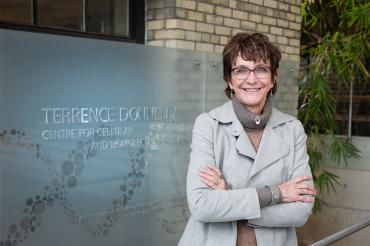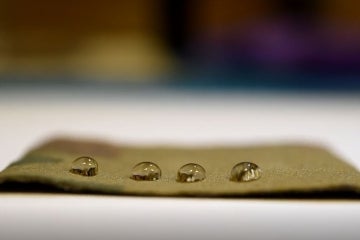'An extraordinary legacy': Brenda Andrews lays a foundation for the future at U of T's Donnelly Centre

Published: August 20, 2020
Praised for her scientific rigour and ingenuity, University Professor Brenda Andrews has many accomplishments to point to during her 15 years as director of the Donnelly Centre for Cellular and Biomolecular Research at the University of Toronto.
The centre, housed in a flagship 21st century science research facility, has become a fertile training ground for future scientific leaders. Public outreach has blossomed and Andrews, who stepped down last month after three successive terms as director, has made an impact as a role model and champion for young scientists.
“The decision to begin my PhD studies in Brenda’s lab almost 30 years ago remains one of the most important and positive decisions I have ever made,” says alumna Vivien Measday, now an associate professor at the University of British Columbia.
“Brenda inspired me with her outstanding work ethic, unbelievable efficiency, energy and focus, as well as her ability to promote a collaborative research atmosphere with other labs. She has always been, and will remain, my number one role model for what a female scientist can achieve in Canada.”
Under Andrews’s leadership, the centre has become a global hub for multidisciplinary research, education and innovation in biomedical science. Andrews also helped establish competitive internal fellowships and awards to attract and honour the best graduate students and post-doctoral researchers, many of whom have gone on to have successful careers in industry and as independent investigators in world-leading research institutions.
“The Donnelly Centre today is recognized as a shining beacon of excellence for Canadian health research and Brenda, as founding director, could not be more widely admired and respected,” said U of T President Emeritus David Naylor, a former dean of the Faculty of Medicine, during a recent online event that celebrated Andrews’s legacy amid the coronavirus pandemic.
“Her qualities of leadership and good judgment have been widely recognized as well as her scientific rigour and ingenuity. It’s an extraordinary legacy.”
Globally recognized for her pioneering research in large-scale genetics and cell biology, Andrews has authored more than 200 scientific articles and reviews and received numerous national and international awards. She is aCompanion of the Order of Canada, a fellow of the Royal Society of Canada, an international member of the U.S. National Academy of Sciences and holds the highest U of T academic rank of University Professor, among other honours.
Bridging the split between basic and applied sciences, Andrews has long supported efforts to turn the centre’s discoveries into medical advances. She spearheaded the launch of the Accelerator for Donnelly Collaboration, a biotechnology incubator for startups and companies to partner with the centre’s investigators. The accelerator was made possible thanks to a gift from Terrence Donnelly, whose initial gift also helped found the centre.
“The past 15 years have been a remarkable journey,” says Andrews. “These are exciting times for biomedicine – in no small part thanks to the insights and the technological advances made by the centre’s investigators.”
“Together, we have built a vibrant research community and I am tremendously proud of all we have accomplished."
Andrews recruited and fostered a community of top researchers from diverse fields of science at all stages in their careers who are asking some of the biggest questions in biology and inventing technologies to answer them. During her tenure, the centre’s investigators transformed our understanding of the core cellular machinery and how it is linked to disease.
The Donnelly Centre also increased female representation among trainees to 40 per cent, while more than half of the global speakers invited to give seminars at the Centre have been women. Science public outreach also thrived, with the centre hosting educational events aimed at instilling curiosity and love of science among young Canadians, especially girls.
From the outset, Andrews was instrumental in creating the environment for Donnelly Centre researchers to flourish.
With open concept labs that foster collaboration, the centre was envisioned as a modern-day successor to the Banting and Best department of medical research – an institute founded in 1930 by Nobel laureate Frederick Banting and Charles Best on the heels of their insulin discovery. It was the first U of T department dedicated solely to research.
At the turn of last century, the late U of T Professor Cecil Yip and Professor Emeritus James Friesen recognized the need to draw expertise from different fields of science to fully harness the potential of rapidly evolving genomic technologies in health research.
Andrews, who previously served as chair of Banting and Best and chair of the department of molecular genetics in the Faculty of Medicine, oversaw the integration of the Banting and Best labs with research teams from the Faculty of Medicine, Faculty of Applied Science & Engineering and Faculty of Arts and Science into the newly founded Donnelly Centre in 2005. She also led the recruitment of top research talent, which has continued in spite of the COVID-19 pandemic.
Andrews completed her doctoral and post-doctoral training at U of T and the University of California, San Francisco, respectively, returning to U of T as an assistant professor in the department of medical genetics (now molecular genetics), which she also chaired from 1999-2004.
A scientific community builder, Andrews contributes her time and expertise to various organizations at home and abroad. She is the founding editor-in-chief of the journal Genes|Genomes|Genetics, an open access journal of the Genetics Society of America. A member of the governing council of the Canadian Institutes for Health Research, the primary federal funding agency for medical research, she also served as the inaugural director of the genetic networks program at the Canadian Institute for Advanced Research.
Andrews’s final term as director ended on June 30, 2020. Her long-time collaborator Professor Charles Boone, will serve as interim director until the appointment of new director by the Faculty of Medicine.



